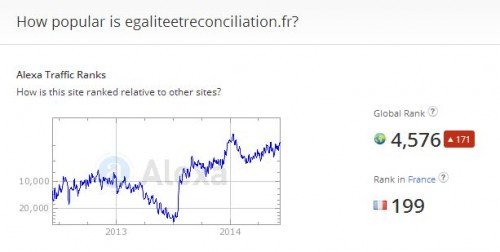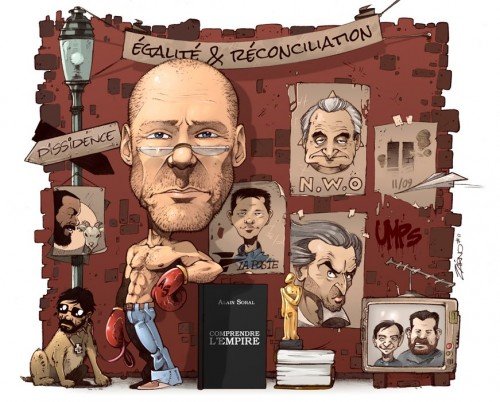Alain Soral FAQ, Part 1

Gallic greetings
Alain Soral has become an influential presence on the French political and cultural scene. The following attempts to shed some light on this complex and fascinating figure.
Part 1:
- What are Alain Soral’s political positions?
- What is Alain Soral’s influence?
- How has Alain Soral become so successful in building an audience?
Part 2:
- What is Alain Soral’s background? Or, from “Game” to Social Conservatism
- What is Alain Soral’s political experience? Or, from Communism to Nationalism
- What are Alain Soral’s relations with other French nationalists?
Part 3:
- What are Alain Soral’s relations with foreign nationalists?
- What are Alain Soral’s views of race?
- What is Alain Soral’s position on the Jewish Question?
- Is Alain Soral of the Right?
Part 1
What are Alain Soral’s political positions?

Typical iconography on the E&R website.
Soral’s political positions are complex but can be summarized as a “French Third Position.” Practical policies include: National sovereignty, halt of immigration, bankster-free economics, social conservatism, non-aligned foreign policy, end to nanny-statism and feminism, return to virility, alliance with Russia, ideally the creation of “European protectionism” to organize the economy on a Continental scale.
A major slogan is “reconciliation.” “Reconciliation” between the “Labor Left” and the “Values Right,” practically meaning a certain economic socialism and social conservatism. “Reconciliation” between ethnic French and Afro-Muslim French citizens around a civic nationalism. “Reconciliation” between the middle and working classes against speculative finance.
Soral is opposed to what he calls “the Empire” as ideology: the ever-creeping bourgeois order which is creating an universal, effeminate, miscegenated, cultureless, global, death-fearing and honorless “Last Man.” The ideology can be described as bourgeois-bohemian (bobo), liberal-libertarian or, to use Jonathan Bowden’s phrase, “left-wing capitalism.” Soral is also opposed to he calls “the Empire” in geopolitics, which is a strange American-financialist-Zionist constellation of interconnected power nodes which is attempting to impose its cultural, ideological, economic and military hegemony world-wide, and destroy all Nation-States. He calls for the alliance of free Nations against “the Empire.”
Soral is considered a Satanic figure by the French politico-media system largely because of his withering critique of the pernicious effects of Jewish ethnocentrism and Zionism (both Israeli and international) on non-Jews.
Different American nationalists will no doubt find much to criticize in this or that part of this agenda (indeed, many French nationalists also differ with Soral), but one should in any case critically engage with him. This is a sophisticated ideological and political project, whatever its internal tensions and imprecisions.
What is Alain Soral’s influence?

I think it is beyond dispute today that Soral and Equality and Reconciliation (E&R) are the single most influential dissident, nationalist and anti-Zionist metapolitical movement in France today and indeed (in terms of audience) quite possibly the Western world. In France certainly, E&R’s audience is greater than nationalists like the Identitaires (although the latter may be stronger on direct action) or the New Right intellectuals who are better known by Anglo nationalists. He is a major gateway for young people to discover nationalism and seems to have a certain influence, necessarily covert, over the younger cadres of the National Front (FN).
Soral and E&R promote their message through numerous means.
Egaliteetreconciliation.fr is an ever-more popular website that is generally among the top 250 most-visited in France (Alexa). It is by far the leading “alt-news” site. As of this writing (14/06/2014) the website is ranked 199th, not far behind slate.fr (French subsidiary of the U.S. Slate) and just ahead of regional newspaper La Dépêche du Midi‘s website, of public TV channel France3’s website, and of gmail.com. In short, E&R’s direct online audience is on a par with major online-only mainstream news sources or a second-tier mainstream newspaper.
Soral’s numerous videos typically get tens or even hundreds of thousands of views. These videos are often remixed independently and these too get similar viewership. They are mostly lectures and “videos of the month,” the latter being interviews covering news (often hilariously, with sections like “Le con du mois” [“Twat of the Month”]) and culture. The cultural videos promote books published by Soral and are often very lengthy, but get similar viewership, suggesting an intellectually committed following. To those who speak French, I can only recommend going through Soral’s video archive, an experience which for me was simply mind-blowing and permanently shattered the mental prison of political correctness I had been trapped in until then.
After his departure from party politics, Soral was able to take stock of his experiences and write Comprendre l’Empire, published in 2011, a 200-page synthesis of his political views. This half-essay, half-manifesto has become an underground bestseller with 80,000 sales and is perennially on Amazon.fr’s politics bestseller list (sometimes #1) despite a total media boycott. Its revealing subtitle gives the gist of the argument: “Tomorrow global governance or the revolt of Nations?”
Soral and his associates have set up a plethora of small businesses, typically with a nationalist angle. These include Prenons le Maquis (camping, survivalism), Sanguis Terrae (wine), Au Bon Sens (organic food) and, perhaps most significantly, the publishing house Kontre Kulture, whose name and mission curiously recall Counter-Currents and which publishes significant out-of-print works and his own authors. Soral, like Counter-Currents and Occidental Observer/Quarterly, believes culture is at the root of many contemporary problems and of challenging the current regime’s supremacy.
Since the summer of 2013, just a year ago, Soral has increasingly broken into mass media coverage. This began with then-Interior Minister Manuel Valls publicly denouncing him as an “enemy of the Republic” in August 2013. Soral also recently published a book co-authored with mainstream TV journalist Éric Naulleau, supposedly of “debates” between the two, which found its way into mainstream bookstores (Dialogues désaccordés). Finally the late 2013–early 2014 anti-Dieudonné crusade, which ended with a governmental ban of the comedian’s show Le Mur, also brought attention to Soral (including a rare interview given to the BBC). Each of these events led the media to switch from systematically ignoring Soral to significant coverage. This coverage, naturally, was exclusively negative, but has nonetheless correlated with an increase in Soral’s audience, posing an intractable problem for the regime, as its propaganda efforts may be self-defeating.
More generally Soral and E&R benefit from the popularity of Dieudonné M’bala M’bala. Although the Franco-Cameroonian comedian is banned from television, demonized by the media, and harassed by the State and ethnically-motivated NGOs, he is able to get massive audiences for his shows. As a measure of his popularity, Dieudonné’s videos generally receive an order of magnitude more views than Soral’s, with hundreds of thousands or millions of hits. Dieudonné’s politics are even more “meta” than Soral’s. He is more a social commentator than a political one. He is an anti-Zionist but not really a nationalist. The two men’s operations have not fused, although there is clearly great porosity and overlap among their supporters.
How has Alain Soral become so successful in building an audience?

Fan art of the Soralian world
Soral’s work since his leaving the National Front has been overwhelmingly metapolitical, eschewing direct electoral politics of any kind, but being supportive of any movement in line with E&R’s goals, above all the FN. He has followed a highly dangerous, high-risk strategy — supposing it was conscious rather than just the reflection of his pigheaded determination to say whatever he thinks — which has ultimately paid off.
However, it is worth stressing the price he has paid for his notoriety. Soral is a leper. All mainstream media and political parties consider him the Devil and even the FN is wary of any appearance of ties. Although now he has a significant audience in his own right, his “anti-Semitism” makes him untouchable even for the far-right (his left-wing friends, if he had any, have long since abandoned him).
Such a strategy is not for everyone, and while this kind of provocative metapolitics can complement the work of other groups, it is not appropriate for direct electoral politics. This strategy, involving total self-marginalization and considerable sacrifice, has likely only proved workable thanks to the internet.
That being said, it is amazing just how much Soral has been able to reach out and expand his audience since 2009, when he became completely free to speak his mind — just five years ago. A number of important factors can be identified.
Soral projects an image of virility. He bows before nothing and is the only one willing to discuss the most taboo issues. He also happens to be a boxer. This appeals to a growing share of both European and non-European male youth who crave masculine role models in our increasingly effeminate and transexual societies.
Soral has an extremely aggressive debating style. Any intellectual, journalist, politician or activist that he considers to be stupid or showing bad faith will be subject to vicious, often hilarious criticism. (Those who speak French can discover this in this compilation of his “Con du mois” [“Twat of the Month”] videos.) For example, the pseudo-subversive comedian Stéphane Guillon once attacked Soral as “dangerous,” he replied saying the following:
A small quenelle since Guillon talked about me: I wonder if there isn’t some genuine jealousy because, I have to recognize it today, I fucked his wife. Maybe he’s angry with me because I fucked his wife. But I think it’s quite unfair to be angry with me and not others because at the time we basically all had a go at it. So I don’t know why he’d be angry with me in particular […] So I reply: not only am I dangerous, but I fucked your wife, and you won’t be fucking mine any time soon. *flips the bird*
Soral’s aggressiveness attracts people for several reasons: The style is approachable for laymen, and the videos spread; all the people who have felt slighted by whomever Soral is criticizing will feel vindicated (often Soral is the only one willing to criticize these people so directly); and finally whoever knows or perhaps supports whomever Soral is criticizing will thus discover Soral. All publicity is good publicity, and there are few better ways of getting it than provoking emotions, both positive and perhaps especially negative.
Soral has had to somewhat downplay these sorts of videos because they have gotten him embroiled in a huge amount of legal cases for defamation and public insult (the land of Voltaire has remarkable trouble with the concept of free speech). He has also engaged in what the regime considers the most extreme provocation, such as performing a quenelle in front of the Berlin holocaust memorial. (Soral is not a holocaust-denier, but he has called for free speech for revisionists; he is being sued by Jewish groups for this gesture to the tune of hundreds of thousands of euros.)
Critically, both Soral and Dieudonné are economically independent from the politico-media Establishment. Dieudonné apparently earns hundreds of thousands of euros annually with his live stand-up comedy shows. Soral seems to get by despite his legal costs through public speaking and the apparently modest income of his various companies (reportedly a few tens of thousands of euros annually). As ever, frugality is freedom!
Soral and Dieudonné have been the only ones willing to talk about the elephant in the room: Jewish ethnocentrism, Jewish elite over-representation, and Zionism. Naturally if others ignore a huge swathe of reality, one must turn to the only ones who discuss it head-on.
Also significantly, Soral’s ostensible stance is one of respect for the French Republic’s stated values: non-recognition of ethnic groups, equality before the law, popular sovereignty. He highlights the contradictions between the regime’s stated values and its actual practice. The regime is thus discredited among people discovering Soral, and they are then psychologically prepared to be eased into his more radical ideas.
Significantly, Soral’s analyses have tended to be vindicated with time. The financial crisis, the euro crisis, the ongoing crisis of democracy, the pathetic sight of the impotent President François Hollande, and especially the continuing, ever-more-flagrant ethnic bias in France and other Western countries’ media coverage and foreign policy — all have confirmed his relevance. (In France this ethnic activism has simply gotten grotesque: including Bernard-Henri Lévy unofficially launching the destruction of Libya, Alain Finkielkraut being promoted to the Académie française, the absurd and legally dubious persecution of Dieudonné including preëmptive censorship, and Zionist agent Manuel Valls’ recent appointment as Prime Minister.)
Above all, Soral has been steady and unapologetic since 2004. He explained:
The System is starting to manufacture Manuel Valls — just as it manufactured Bayrou at one time, Mélenchon at another — that’s why he shouldn’t dream. He has the impression that he’s getting ahead very quickly but it’s because he has a booster. The day they remove the booster he will go much less fast. Me, I move forward with the winds against me, so I pedal with big calves.
One can be dependent on the regime, perhaps influence it internally but still be vulnerable to its whims. Or one can be independent. (No doubt these roles can be complementary, with external critics and circumspect regime-employed crypto-nationalists.)
End of Part 1.





Comments are closed.